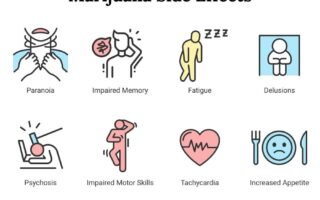As the world shifts toward a more progressive stance on marijuana use, a complex narrative unfolds beyond the haze of its benefits. While countless studies speak to its medicinal properties and recreational joys, it is essential to delve into the less-discussed aspects of this multifaceted plant. In this exploration of the cons of marijuana, we will navigate the various pitfalls that accompany its consumption and legalization. From health concerns to societal implications, the conversation surrounding marijuana is far from one-dimensional. Join us as we unravel the intricacies of marijuana’s impact, aiming for a balanced understanding that considers both the light and shadow cast by this controversial herb.
Table of Contents
- Impact on Mental Health and Cognitive Function
- Legal and Social Implications of Marijuana Use
- Physical Health Risks Associated with Chronic Consumption
- Navigating Responsible Use and Harm Reduction Strategies
- Q&A
- Insights and Conclusions
Impact on Mental Health and Cognitive Function
The effects of marijuana on mental health can be complex and multifaceted. While some individuals may experience temporary relief from anxiety and stress, others may find that its usage exacerbates existing mental health conditions or leads to new issues. Common mental health challenges associated with marijuana use include:
- Anxiety and Paranoia: Increased feelings of unease or dread after consumption.
- Depression: A potential exacerbation of depressive symptoms over time.
- Psychoactive Effects: Altered perceptions and potential hallucinations in some users.
Moreover, the impact on cognitive function is equally significant. Research has indicated that regular cannabis use, especially during adolescence when the brain is still developing, can impair cognitive abilities. Key areas affected may include:
| Function | Impact |
|---|---|
| Memory | Difficulty forming new memories and retrieving existing ones. |
| Attention | Reduced ability to focus on tasks or filter distractions. |
| Decision-Making | Compromised ability to make sound judgments. |
Legal and Social Implications of Marijuana Use
Physical Health Risks Associated with Chronic Consumption
Frequent marijuana consumption can lead to a variety of physical health issues that may not be immediately apparent. Long-term use is associated with respiratory complications, particularly for those who smoke the substance. Regular inhalation of marijuana smoke can irritate the lungs and lead to chronic bronchitis symptoms, which manifest as a persistent cough and phlegm production. Additionally, heavy users may experience diminished lung function over time, resembling the effects of tobacco smoke. The effects on the cardiovascular system are also noteworthy, as marijuana can increase heart rate and blood pressure, heightening the risk of heart-related complications.
In addition to respiratory and cardiovascular concerns, chronic marijuana use can affect other aspects of physical health. There is evidence suggesting potential impacts on the immune system, which may make regular users more susceptible to infections and illnesses. Furthermore, the long-term effects on weight management have garnered attention, as marijuana is known to increase appetite leading to poor dietary choices and overeating. A table summarizing key is shown below:
| Health Risk | Description |
|---|---|
| Respiratory Issues | Chronic bronchitis and reduced lung function. |
| Cardiovascular Effects | Increased heart rate and potential blood pressure issues. |
| Immune System Suppression | Higher risk of infections and illnesses. |
| Weight Management Problems | Increased appetite leading to unhealthy eating habits. |
Navigating Responsible Use and Harm Reduction Strategies
Understanding the risks associated with marijuana use is essential for promoting healthy choices. While many advocate for its benefits, it’s crucial to recognize the potential downsides that can impact users both physically and mentally. Some concerns include:
- Impaired Cognitive Function: Marijuana can alter brain function, affecting memory, attention, and judgment.
- Respiratory Issues: Smoking marijuana poses similar risks as tobacco, potentially leading to chronic bronchitis.
- Dependency Risks: Some users may develop a problematic relationship with marijuana, affecting their daily lives.
To mitigate these risks and promote a safer experience, harm reduction strategies should be at the forefront of discussions surrounding marijuana use. Individuals can benefit from:
- Educating Themselves: Understanding dosages and methods of consumption can lower risks.
- Using Lab-Tested Products: Ensures potency and safety, reducing exposure to contaminants.
- Practicing Moderation: Limiting intake can decrease the likelihood of negative side effects.
| Potential Risks | Harm Reduction Strategies |
|---|---|
| Impaired Coordination | Avoid driving or operating machinery after use |
| Anxiety and Paranoia | Start with low doses and choose strains wisely |
| Lung Health Concerns | Consider edibles or vaporizers instead of smoking |
Q&A
Q&A: Understanding the Cons of Marijuana Use
Q: What are some of the potential health risks associated with marijuana use?
A: While marijuana is often touted for its medicinal properties, it can also pose health risks, particularly when used frequently or in high doses. Some studies suggest that regular use may lead to respiratory issues, especially when smoked, similar to the effects of tobacco. Furthermore, heavy use can lead to dependence or addiction in some individuals, as well as anxiety, paranoia, and psychosis, particularly in those with a predisposed risk.
Q: How does marijuana affect cognitive function?
A: Marijuana can temporarily impair short-term memory, attention span, and decision-making abilities. Research indicates that during intoxication, users may find it more challenging to concentrate or recall information. Long-term use, especially beginning in adolescence, has been connected with potential declines in cognitive performance, raising concerns about its impact on brain development in young users.
Q: Is there a risk of cannabis use leading to problematic behaviors?
A: Yes, cannabis use can sometimes be linked to increased risk-taking behavior. Studies have shown that individuals who use marijuana may be more prone to participate in risky activities, including impaired driving and unsafe sexual practices. These behaviors can have serious consequences not only for the user but also for those around them.
Q: How does marijuana use interact with mental health?
A: Marijuana’s impact on mental health is complex and varies among individuals. For some, it may provide relief from certain symptoms of mental health conditions, while for others, it can exacerbate issues like anxiety, depression, or schizophrenia. This duality underscores the importance of considering personal mental health history when evaluating the potential consequences of marijuana use.
Q: What societal issues can arise from marijuana legalization?
A: While legalization may offer benefits such as tax revenue and job creation, it can also lead to societal concerns. There may be an increase in marijuana use among adolescents, targeted advertising strategies, or normalization of drug use, which can contribute to a culture where substance use is seen as more acceptable. Additionally, issues related to impaired driving and workplace safety may become more prevalent as use becomes more widespread.
Q: Are there any legal consequences related to marijuana use in certain places?
A: Yes, despite increasing legalization efforts, marijuana remains illegal at the federal level in many countries, including the United States. This can lead to potential legal repercussions for users, including fines, misdemeanors, or felonies, depending on the jurisdiction. Additionally, individuals may face complications with employment, housing, or academic opportunities due to their marijuana use or past convictions related to it.
Q: Can marijuana consumption affect academic or work performance?
A: Marijuana use can negatively impact both academic and work performance. As previously mentioned, cognitive impairments may hinder productivity and the ability to learn or retain information effectively. Additionally, issues such as absenteeism and lower motivation have been observed among regular users, which can further hinder success in school or workplace environments.
By understanding these potential disadvantages, individuals can make more informed choices about marijuana use, weighing the pros and cons based on their unique situations and experiences.
Insights and Conclusions
As we draw the curtains on our exploration of the less-discussed aspects of marijuana use, it becomes clear that the conversation surrounding this multifaceted plant is far from black and white. While advocates celebrate its therapeutic potential and recreational allure, it’s essential to acknowledge the accompanying challenges—be it health risks, societal implications, or regulatory pitfalls. Understanding these cons is not an attempt to vilify marijuana but to foster a more informed and balanced dialogue. As society navigates the evolving landscape of cannabis legalization and acceptance, embracing both the benefits and drawbacks will equip us to make wiser, more conscientious choices. The journey continues to unfold, and the important discussions surrounding marijuana are just beginning. So, whether you stand on the side of caution or curiosity, may this knowledge guide you in navigating the intricate world of cannabis with thoughtfulness and an open mind.

